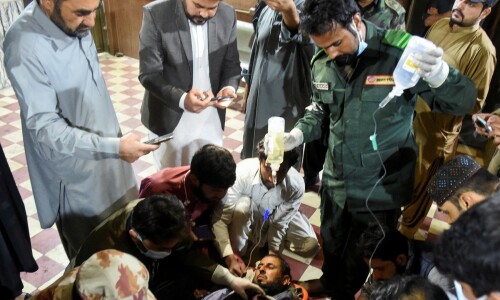
ISLAMABAD, March 9: Pakistan on Tuesday test-fired its longest-range nuclear-capable ballistic missile in a move to try out a key strategic weapon and to practically declare that its vow to maintain a credible deterrence has remained unshaken by a recent nuclear proliferation scandal.
The maiden test-firing of the two-stage Hatf VI, or Shaheen II, missile was successfully carried out, a military statement said without specifying the location of the launch and impact of the weapon that it said could hit targets up to 2,000km. But Dr Samar Mubarakmund, chairman of the National Engineering and Science Commission (Nescom) that oversees the Shaheen project by its National Defence Complex subsidiary, indicated the missile had impacted somewhere in the Arabian Sea.
Speaking at a private TV channel, he said the missile's actual range was up to 2,500km but was restricted to 2,000km so as not to cross Pakistan's declared territorial sea limit. The Shaheen II's range exceeds the 1,500km range of previously tested Hatf V, or Ghauri II, which is based on liquid fuel and can also carry nuclear warheads.
"The two-stage Shaheen II missile system, which has been indigenously developed by Pakistani scientists and engineers, can carry all types of warheads up to 2,000km," a statement issued by the Inter-Services Public Relations (ISPR) said.
"By the grace of Allah, all the planned technical parameters were successfully validated during the test-fire," it said. Tuesday's test fulfils a promise made by President Pervez Musharraf for the launch at a Feb 5 news conference in Islamabad when he had dismissed apprehensions that Pakistan could rollback its nuclear weapons programme because of the proliferation scandal.
The test comes eight days before US Secretary of State Colin Powell is due to visit Islamabad on March 17-18 as part of a regional trip and is likely to discuss Washington's nuclear concerns with Pakistani leadership.
Pakistan had informed neighbouring countries about the test "as a confidence-building measure," the ISPR statement said. It said the test "demonstrates Pakistan's advanced scientific capability in strategic field and is a tribute to the brilliance, hard work and patriotism of its dedicated community of scientists, engineers and technicians".
"It reflects Pakistan's resolve to maintain minimum credible deterrence as the cornerstone of its security policy," the statement said. It said both President Musharraf and Prime Minister Zafarullah Khan Jamali had congratulated all personnel involved in the successful development and launching of the Shaheen II missile system.
ROLL FORWARD: Vice-Chief of the Army Staff Gen Mohammad Yousaf described the test as a demonstration of a "full-speed roll forward" of the country's nuclear programme.
In a TV interview, he described the test as of "great importance" because it was Pakistan's first experiment of a two-stage missile compared to previous one-stage missiles, such as the Ghauri missile made by the Khan Research Laboratories founded by Dr Khan.
It was stated at the time of first test of single-stage Ghauri II in 1998 that missile's range could be increased to 2,500km but it has not been done so far.
Gen Yousaf said it was the first time that the experiment of "separation" of the first and second stages was carried out in Pakistan and "it was successful in all respects". Addressing those who feared a nuclear rollback, the general said there was "no rollback" and added that it was a rather "full-speed roll forward".
JAPAN'S CONCERN: The Japanese government on Tuesday regretted the missile test but said it hoped the move would "not bring about a negative effect on the positive developments between India and Pakistan towards improving their relations".
A Japanese embassy press release issued in Islamabad quoted a statement by the country's foreign ministry as calling upon Pakistan to "respond sincerely to the efforts by the international community for the non-proliferation of weapons of mass destruction and ballistic missiles".

















































